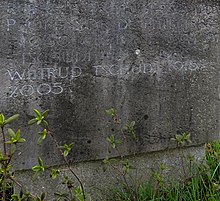Rudolf Tschudi

Rudolf Tschudi (born May 2, 1884 in Glarus ; † October 11, 1960 in Basel ) was a Swiss philologist and orientalist in Basel .
life and work
Rudolf Tschudi studied in Basel, Erlangen and Tübingen and, as a student, became a member of the Schwizerhüsli Basel , the Erlanger and the Tübingen Wingolf . Later he also joined the Carolingia Zurich . In Erlangen he received his doctorate under Georg Jacob in 1910 , after which he went to the Department of History and Culture of the Hamburg Colonial Institute as an assistant to Carl Heinrich Becker . During that time he got to know Enno Littmann , with whom he was to become a lifelong friend. In 1911 Tschudi moved to Tübingen to do his habilitation there. In 1914, however, before completing his habilitation, he was appointed Becker's successor to Hamburg. In 1913 he became co-editor of the " Turkish Library " series, and since 1914 he has held the same position for the magazine "Der Islam". Through several stays in the Ottoman Empire since 1909, Tschudi had also got to know the living tradition of dervishism (especially the Bektași) and laid the foundation for his extensive collection of predominantly Ottoman-Turkish, but also Arabic and Persian manuscripts. Tschudi spent the years of the First World War in Hamburg, after the war he returned to Switzerland. In 1919 he first became associate professor for oriental languages in Zurich, in 1922 he was appointed full professor to Basel, where the position of Friedrich Schulthess, who had died in office, had to be filled again. Tschudi taught in Basel until his retirement in 1949.
Rudolf Tschudi's main research area was the Ottoman-Turkish language and culture as well as the history of the Ottoman Empire. With his teacher Georg Jacob he also shared an interest in contemporary Sufism . He was an excellent speaker - his historical studies often emerged from speeches - but found it difficult to formulate it in writing. His scientific oeuvre is therefore not very broad, but exclusive. He enjoyed a high reputation among his peers, and he also provided material support to his German colleagues in difficult times: "He was one of those rare scholars who prefer to say only good things about their fellow men and who are always ready to praise others". The initiative to set up the subject of Egyptology at the University of Basel was mainly due to him.
The collecting of oriental manuscripts was an important part of his scientific activity. He had already started to acquire Arabic, Persian and Ottoman-Turkish manuscripts early on. He donated the collection to the Basel University Library , which owes most of its oriental manuscript holdings to Rudolf Tschudi. He also bequeathed his own academic estate to the Basel University Library.
Publications
- The Aṣafnâme of the Luṭfî Pasha. Based on the manuscripts from Dresden, Vienna and Constantinople . Mayer & Müller, Berlin 1910 (dissertation).
- The viljet-name of Hajim Sultan . Published for the first time and translated into German. Mayer & Müller, Berlin 1914.
- A letter Sülejmāns I. Ferdinand I . In: Theodor Menzel (Ed.): Festschrift Georg Jacob on his seventieth birthday, May 26, 1932 . Harrassowitz, Leipzig 1932, pp. 317–328.
- The Chaliphate . JCB Mohr, Tuebingen 1926.
- The Ottoman Empire . In: Hesperia . Volume 10, 1953, pp. 52-70 (special issue with the title: Gestalten und Bewegungs des Vorderen Orients ).
literature
- Fritz Meier : Rudolf Tschudi (1884-1960) . In: Islam. Volume 38, 1962, pp. 138-141 (with list of writings).
- Andreas Bigger: Tschudi, Rudolf. In: Historical Lexicon of Switzerland .
- Wolfgang Behn: Concise biographical companion to Index Islamicus . Volume 3, 2004, p. 539.
- Claudia Bolliger (among others): Rudolf Tschudi and his scientific network in the mirror of selected letters. In: Claudia Bolliger, Renate Würsch (Ed.): View of the Orient. From the Oriental Seminar to the Seminar for Middle East Studies at the University of Basel (1919-2019) (= publications of the University Library of Basel . Volume 46). Schwabe Verlag, Basel 2019, ISBN 978-3-7965-4029-5 , pp. 67–99.
- Gudrun Schubert and Renate Würsch: About tendrils, dots and bookworms. The Basler Orientstudien, the seminar and the Orientalia of the university library. In: Claudia Bolliger, Renate Würsch (Ed.): View of the Orient. From the Oriental Seminar to the Seminar for Middle East Studies at the University of Basel (1919-2019) (= publications of the University Library of Basel . Volume 46). Schwabe Verlag, Basel 2019, ISBN 978-3-7965-4029-5 , pp. 179–199.
- Claudia Bolliger: The photographer's gaze - the oriental photographs in the Rudolf Tschudi estate. In: Claudia Bolliger, Renate Würsch (Ed.): View of the Orient. From the Oriental Seminar to the Seminar for Middle East Studies at the University of Basel (1919-2019) (= publications of the University Library of Basel . Volume 46). Schwabe Verlag, Basel 2019, ISBN 978-3-7965-4029-5 , pp. 217-250.
Web links
Individual evidence
- ↑ 687 letters from Littmann to Tschudi are kept in the University Library of Basel, Sign. NL 287: A 94.1-687 .
- ↑ Claudia Bolliger (among others): Rudolf Tschudi and his scientific network , p. 69.
- ^ Fritz Meier: Rudolf Tschudi (1884-1960) . In: Islam. Volume 38, 1962, p. 140.
| personal data | |
|---|---|
| SURNAME | Tschudi, Rudolf |
| BRIEF DESCRIPTION | Swiss philologist and orientalist |
| DATE OF BIRTH | May 2, 1884 |
| PLACE OF BIRTH | Glarus |
| DATE OF DEATH | October 11, 1960 |
| Place of death | Basel |